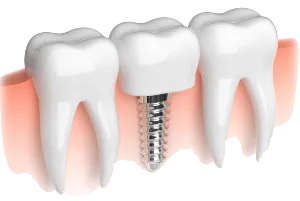Dental implants are an advanced medical procedure designed to replace missing teeth with artificial roots, typically made from titanium. These roots are implanted into the jawbone and left to integrate naturally with the bone, forming a strong and stable foundation for a crown, bridge, or denture.
Procedure: The dental implant process begins with an initial assessment, where the dentist evaluates the condition of the jawbone and gums to ensure there is enough bone to support the implant. If the bone is insufficient, a bone graft may be necessary before the implant can be placed. Once the site is ready, the implant is inserted into the bone under local anesthesia. The implant is then left for several months to fuse with the bone in a process known as osseointegration. In the final step, a custom-made crown is attached to the implant.
Benefits: Dental implants offer numerous advantages. First, they provide a natural appearance and function similar to real teeth, enhancing the patient’s comfort and confidence. Second, implants help preserve the jawbone and prevent its deterioration, a common issue following tooth loss. Additionally, implants are a long-lasting and sustainable solution compared to other alternatives like traditional bridges or removable dentures.
Available Options: Several options exist for dental implants, depending on the patient’s condition and needs. These include single implants for replacing one tooth or multiple implants to support a bridge or full denture. Another option is the All-on-4 technique, which allows for a full set of teeth to be supported by only four implants per jaw.
In conclusion, dental implants are an effective and durable solution for replacing missing teeth, significantly improving patients’ quality of life by restoring natural oral function and aesthetics.

